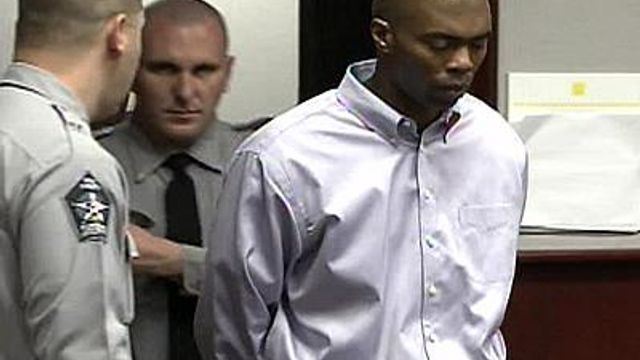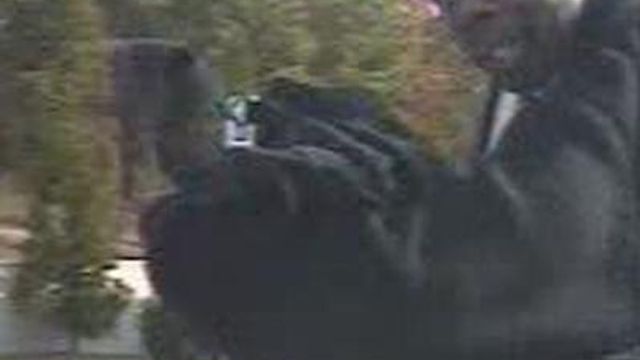Defense: Murder suspect suffered from years of abuse
Defense attorneys for Samuel James Cooper don't deny he shot and killed five people. What's disputed, they say, is his mental condition at the time of the crimes.
Posted — Updated"Our client shot and killed five persons. That's not the issue in this case," attorney Stephen Freedman told jurors during opening statements in the murder trial of Samuel James Cooper.
"The question is going to be, 'At the moment of the shooting, did Sammy Cooper act with premeditation and deliberation?' And the answer to that question is directly linked to his mental condition," he continued.
Authorities arrested Cooper Nov. 21, 2007, following a robbery at a Garner bank. They later charged him in the slayings after he confessed to the crimes and after ballistics evidence from a 9 mm handgun in his possession linked him to the killings.
But Cooper suffers from a diminished capacity – Freedman said it is the result of regular beatings, starting when he was a baby – that affect his ability to think clearly, particularly in moments of stress.
"To understand what happened between May 2006 and November 2007, you've got to understand the roots of who Sammy Cooper is. You've got to understand his story," Freedman said.
Cooper was 3 months old when his father first shook him, smacked him and threw him across the room. For nearly 17 years, he and his siblings were beaten. The "weapon of choice," Freedman said, was a leather belt.
The beatings were so bad that the children often considered killing themselves and also talked about killing their father, Freedman continued. As Cooper grew older, he would often take beatings to protect his siblings.
After age 13, he stopped crying when he was beaten, Freedman said.
"He took himself away. He separated himself from what was going on around him," he said.
Cooper left home in 1994 and was later convicted on charges of selling drugs and robbery. He spent time in and out of prison until February 2006, Freedman said.
"He does not have the same emotions that any of us do," Freedman told jurors. "What happened to Sammy Cooper in the 17 years at home very much has to do with what happened at the time of the offenses … The fact is that trigger was pulled years before these offenses ever occurred."
Earlier Monday, Wake County Assistant District Attorney Adam Moyers described the victims as five individuals from different backgrounds who were all minding their own business when Cooper allegedly shot and killed them.
"Five dead men. One gun. One killer. No doubt about that," he said.
According to Moyers:
Haj-Hussein, 43, had recently purchased the In & Out Food Mart on Creech Road in Raleigh and was getting ready for the day on May 12, 2006, when Cooper robbed him and shot him twice – at least once from close range – in the store's bathroom.
Jernigan. 41, was cleaning the Circus Restaurant at 1600 Wake Forest Road on June 3, 2006, when Cooper, thinking Jernigan was the manager, encountered him in the kitchen and shot him from close range once to the head.
Barnwell, a Star Wars collector and rap music enthusiast, was at home in his second-floor north Raleigh apartment on April 27, 2007, when Cooper, thinking he was a "big-time drug dealer,” handcuffed, hogtied and duct-taped him and then ransacked his apartment looking for drugs and money. Barnwell, 34, managed to jump over the balcony before Cooper shot him five times.
High, 48, was homeless and worked small jobs near St. Augustine's College, where Cooper shot him multiple times in the arm and back on Oct. 12, 2007. The two knew each other, but High was an unintended target in an argument between Cooper and a group of gang members.
Hussain, 52, also an entrepreneur, was working inside Bobby's Grocery on Garner Road on Oct. 14, 2007, going about his daily routine when Cooper shot him. Surveillance video showed Hussain attempting to use his own gun to defend himself and his business before he was shot twice.
"(They were) five men with some things in common, but they don't know each other" Moyers said. "The one thing that does connect them all is Sam Cooper and that 9 mm Ruger handgun."
It was more than a month after the fifth slaying, on Nov. 21, 2007, that Cooper allegedly robbed the Bank of America on Benson Road in Garner.
Several bank employees testified Monday to seeing a masked black man dressed in black jump the counter. Investigators testified that more than $41,000 was stolen.
Customer John Pendergraft testified to following Cooper after seeing him, unmasked, leave the bank in a white minivan. Authorities credited him with helping keep them aware of the vehicle's location.
Garner police officer Benjamin Deese testified to pursuing the van for about 15 minutes to the Domino's Pizza distribution center on Waterfield Drive, where Cooper's mother worked at the time.
Deese trapped the minivan in the parking lot, and Cooper jumped out, jumped over the police car and fled inside the distribution center, dropping money and a gun authorities linked to the shootings.
"We not only have ballistics match to that gun to bullets from all five homicides," Moyers said, "we have his detailed confession to how he killed each one of these individuals.
"It became necessary to neutralize them so that he could get away with the robbery – except for poor Ricky High, who was killed because he was in the wrong place at the wrong time.
"These are Cooper's own words, and they match all the known facts about all these cases."
Defense attorneys tried to get the confession thrown out last year, arguing that investigators coerced their client into admitting to the crimes.
Police investigators testified that Cooper initially denied being involved in the homicides but later confessed and provided details of the crimes not made public after prosecutors agreed to dismiss a weapons charge against his father.
• Credits
Copyright 2024 by Capitol Broadcasting Company. All rights reserved. This material may not be published, broadcast, rewritten or redistributed.






